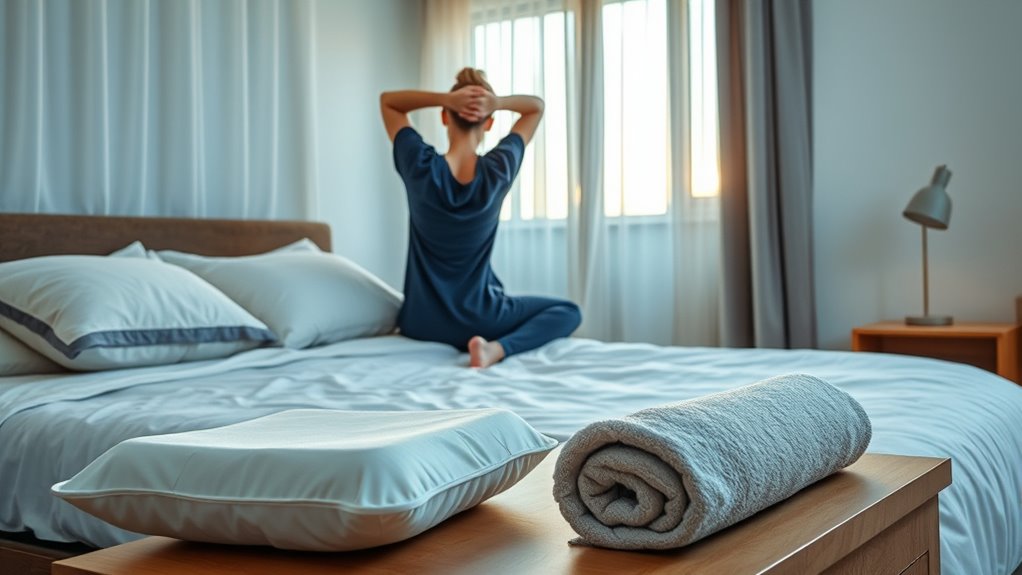Waking up with back pain often happens because of poor sleep habits, bad posture, or an unsupportive mattress. Sleeping positions that twist or strain your spine, combined with stress on muscles and joints, make mornings painful. Choosing a supportive mattress and pillows, adjusting your sleep posture, and doing gentle morning stretches can ease discomfort. If pain persists, professional help might be needed. Keep going to discover the best ways to improve your back health.
Key Takeaways
- Poor sleep positions and unsupported mattresses can misalign the spine, causing morning back pain.
- Sleeping on the stomach strains the lower back and neck, leading to discomfort upon waking.
- Choosing a supportive mattress and ergonomic pillows helps maintain proper spinal alignment overnight.
- Incorporating gentle morning stretches and exercises can relieve muscle tightness and improve flexibility.
- Persistent or severe pain may require professional assessment, such as physical therapy or chiropractic care.
Common Causes of Morning Back Pain

Morning back pain often stems from various underlying issues that worsen overnight or first thing in the morning. Poor posture during the day can lead to muscle strain and misalignment, causing discomfort when you wake up. Lack of posture correction throughout the day contributes to tight muscles and joint stress, which become more noticeable after hours of inactivity. Additionally, not using ergonomic accessories like supportive chairs or mattresses can put extra pressure on your spine while you sleep or rest. Over time, this stress accumulates, resulting in morning pain. Addressing these causes involves improving your posture habits and investing in ergonomic solutions that support proper spinal alignment. Regular posture assessment and ergonomic adjustments can further help prevent morning back pain. These adjustments can markedly reduce morning back pain and improve your overall comfort.
The Impact of Sleep Positions on Back Health

Your sleep position plays a vital role in how your back feels when you wake up. Maintaining a good sleep posture helps keep your spine aligned and reduces strain on your muscles and ligaments. Sleeping on your stomach can twist your neck and put unnecessary pressure on your lower back, leading to morning pain. Instead, try sleeping on your side or back, which supports proper spinal alignment. Pillow support is essential—use a pillow that keeps your head and neck in line with your spine. For side sleepers, a pillow between your knees can help stabilize your pelvis. Back sleepers benefit from a pillow under their knees to reduce lower back stress. Adjusting your sleep posture and ensuring proper pillow support can greatly improve your back health overnight.
Choosing the Right Mattress and Pillow

Selecting the right mattress and pillow is essential for waking up with less back pain, as they directly influence spinal alignment and support throughout the night. A mattress with memory foam offers excellent ergonomic support by contouring to your body’s shape, reducing pressure points. It helps keep your spine aligned whether you’re a back, side, or stomach sleeper. Your pillow should complement your mattress, providing proper neck support and maintaining natural spinal curves. Opt for a pillow that offers ergonomic support, ensuring your neck isn’t strained overnight. When choosing, consider firmness, material, and your sleeping position. Additionally, the color accuracy of your bedding can influence overall comfort and sleep quality. Investing in a supportive mattress and pillow tailored to your needs can appreciably reduce morning back pain and improve your overall sleep quality.
Incorporating Gentle Morning Stretches and Exercises

After ensuring your mattress and pillow provide proper support, incorporating gentle stretches and exercises into your morning routine can further alleviate back pain. Focus on mindful stretching, paying attention to how your body feels during each movement. Gentle exercises like cat-cow stretches, pelvic tilts, and knee-to-chest pulls help loosen tight muscles and improve flexibility. Take slow, deliberate breaths to enhance relaxation and awareness of your body. Avoid rushing through these movements; instead, maintain a gentle pace that feels comfortable. Consistent morning stretching can reduce stiffness, improve circulation, and set a positive tone for the day. Recognizing the importance of emotional support can also help you stay motivated and consistent with your routine. Over time, these mindful stretches become an effective part of your back pain prevention routine.
When to Seek Professional Help

While mild back pain during the morning can often be managed with self-care, persistent or severe symptoms indicate it’s time to seek professional help. If your pain continues despite rest, stretches, or over-the-counter remedies, consult a healthcare provider. Physical therapy can help identify underlying issues and develop targeted exercises to strengthen your back. Chiropractic care may also relieve pain by realigning your spine and improving mobility. Don’t ignore warning signs like numbness, weakness, or pain that worsens throughout the day. If your morning back pain affects your daily activities or sleep, seeking professional evaluation is essential. Early intervention can prevent chronic issues and restore your back’s health, making it easier to start each day pain-free. Understanding the role of spinal alignment can also guide effective treatment strategies.
Frequently Asked Questions
Can Diet Influence Morning Back Pain?
Yes, your diet can influence morning back pain. By making better nutritional choices, you can help reduce inflammation, which often contributes to discomfort. Focus on eating anti-inflammatory foods like fruits, vegetables, and omega-3-rich fish. Avoid processed foods and excess sugar, as they can increase inflammation. Proper nutrition supports your body’s healing and reduces pain, making mornings more comfortable and helping you start your day feeling better.
How Does Stress Affect Back Discomfort Upon Waking?
You might think stress doesn’t affect back pain, but it actually does. Stress management helps reduce hormonal fluctuations that tighten muscles and increase discomfort. When you’re stressed, your body produces more cortisol, which can cause muscle tension and inflammation, making your back hurt more in the morning. Incorporate relaxation techniques like deep breathing or meditation to ease stress, improve sleep, and lessen your back discomfort.
Are There Specific Sleep Aids That Help Reduce Back Pain?
Yes, certain sleep aids can help reduce back pain. You should focus on maintaining a good sleep position, like sleeping on your side with a pillow between your knees, and choosing a supportive mattress type, such as memory foam or hybrid. These options help keep your spine aligned and reduce pressure points. Investing in the right sleep setup can make a significant difference in alleviating morning back pain.
Does Age Impact the Likelihood of Waking With Back Pain?
Yes, age definitely increases your chances of waking with back pain. As you age, age-related degeneration and spinal wear weaken your structures, making discomfort more common. These changes can cause less cushioning and stability in your spine, leading to morning stiffness and pain. Staying active, practicing good posture, and maintaining a healthy weight can help combat these effects. Regular checkups also catch issues early before they worsen.
Can Dehydration Contribute to Morning Back Stiffness?
Dehydration can definitely contribute to morning back stiffness. When you’re dehydrated, you may experience dehydration symptoms like dry mouth and fatigue, which can lead to muscle fatigue and tightness. This muscle fatigue makes your back more prone to stiffness and discomfort when you wake up. To help, drink enough water throughout the day, especially before bed, to keep your muscles hydrated and reduce morning back pain.
Conclusion
By paying attention to your sleep habits and making simple adjustments, you can turn your mornings from a painful chorus into a harmonious start. Think of your back as a delicate instrument—when tuned properly with the right mattress, pillow, and gentle stretches, it can play a beautiful symphony each day. Don’t hesitate to seek help if pains persist; after all, your back’s health is the foundation of your daily rhythm.









